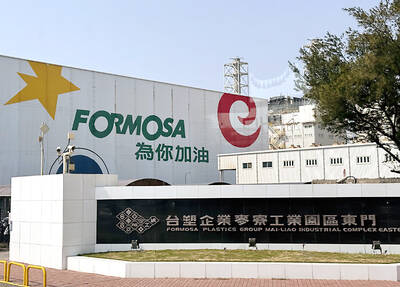The UK will press Taiwan to overhaul the way it buys medicines so that patent-protected drugs make up a greater share of its purchases, a UK minister said.
“We want them to look at the industry differently,” UK Trade Minister Gareth Thomas said in an interview. “We want British companies to have a significant presence in Taiwan and for Taiwan to get the access to the best drugs and do it in a way that’s sustainable.”
The request, to be made during a visit by Thomas next week, is meant to help UK pharmaceuticals GlaxoSmithKline Plc and AstraZeneca Plc and gain greater access to Taiwan’s market. Currently, almost all of the US$4.32 billion in medicines used annually in the island state are generics, UK officials said.
Thomas, the first UK minister to visit Taiwan since 2002, is traveling to the country as part of a trade mission to Asia that will also take him to Malaysia, Singapore and Vietnam. Executives from the two largest UK drugmakers, as well as some from HSBC Holdings Plc and other companies will join him for parts of the trip.
After a sharp fall in the pound last year made British exports cheaper, British Prime Minister Gordon Brown’s government is promoting trade to help counter the UK’s first recession since 1991. The pound lost 25 percent of its value against a basket of the currencies of the UK’s main trading partners in 2008.
Brown has repeatedly said that reaching a new agreement at the WTO was necessary to combat the global economic slowdown.
“What everybody had hoped for was a July agreement,” Thomas said.
That didn’t happen and then governments were “diverted by the financial crisis, which slowed technical progress,” he said.
Brown will step up his push for a global trade deal in the run up to the Group of 20 summit he is hosting in the UK on April 2.
“There is no intrinsic reason why it can’t happen,” Thomas said. “Britain is not going to be backing off on trade.”
The trip to Southeast Asia is also meant to highlight opportunities for UK companies. The region currently accounts for £9.2 billion (US$14 billion) in UK export earnings, compared with £5.22 billion for China and £4.65 billion for India, the Department for Business, Enterprise and Regulatory Reform said.
“This is one route out of recession,” Thomas said. “Companies are looking to these growth markets and not just at China and India. My job is to open doors for British business.”
In Malaysia, Thomas hopes to settle a Memorandum of Understanding on Islamic finance, encouraging investors from the country to look to London for banking services. Islamic finance is currently worth about £250 billion in revenue in the UK.

EXTRATERRITORIAL REACH: China extended its legal jurisdiction to ban some dual-use goods of Chinese origin from being sold to the US, even by third countries Beijing has set out to extend its domestic laws across international borders with a ban on selling some goods to the US that applies to companies both inside and outside China. The new export control rules are China’s first attempt to replicate the extraterritorial reach of US and European sanctions by covering Chinese products or goods with Chinese parts in them. In an announcement this week, China declared it is banning the sale of dual-use items to the US military and also the export to the US of materials such as gallium and germanium. Companies and people overseas would be subject to

Taiwan Semiconductor Manufacturing Co (TSMC, 台積電) founder Morris Chang (張忠謀) yesterday said that Intel Corp would find itself in the same predicament as it did four years ago if its board does not come up with a core business strategy. Chang made the remarks in response to reporters’ questions about the ailing US chipmaker, once an archrival of TSMC, during a news conference in Taipei for the launch of the second volume of his autobiography. Intel unexpectedly announced the immediate retirement of former chief executive officer Pat Gelsinger last week, ending his nearly four-year tenure and ending his attempts to revive the

WORLD DOMINATION: TSMC’s lead over second-placed Samsung has grown as the latter faces increased Chinese competition and the end of clients’ product life cycles Taiwan Semiconductor Manufacturing Co (TSMC, 台積電) retained the No. 1 title in the global pure-play wafer foundry business in the third quarter of this year, seeing its market share growing to 64.9 percent to leave South Korea’s Samsung Electronics Co, the No. 2 supplier, further behind, Taipei-based TrendForce Corp (集邦科技) said in a report. TSMC posted US$23.53 billion in sales in the July-September period, up 13.0 percent from a quarter earlier, which boosted its market share to 64.9 percent, up from 62.3 percent in the second quarter, the report issued on Monday last week showed. TSMC benefited from the debut of flagship

TENSE TIMES: Formosa Plastics sees uncertainty surrounding the incoming Trump administration in the US, geopolitical tensions and China’s faltering economy Formosa Plastics Group (台塑集團), Taiwan’s largest industrial conglomerate, yesterday posted overall revenue of NT$118.61 billion (US$3.66 billion) for last month, marking a 7.2 percent rise from October, but a 2.5 percent fall from one year earlier. The group has mixed views about its business outlook for the current quarter and beyond, as uncertainty builds over the US power transition and geopolitical tensions. Formosa Plastics Corp (台灣塑膠), a vertically integrated supplier of plastic resins and petrochemicals, reported a monthly uptick of 15.3 percent in its revenue to NT$18.15 billion, as Typhoon Kong-rey postponed partial shipments slated for October and last month, it said. The